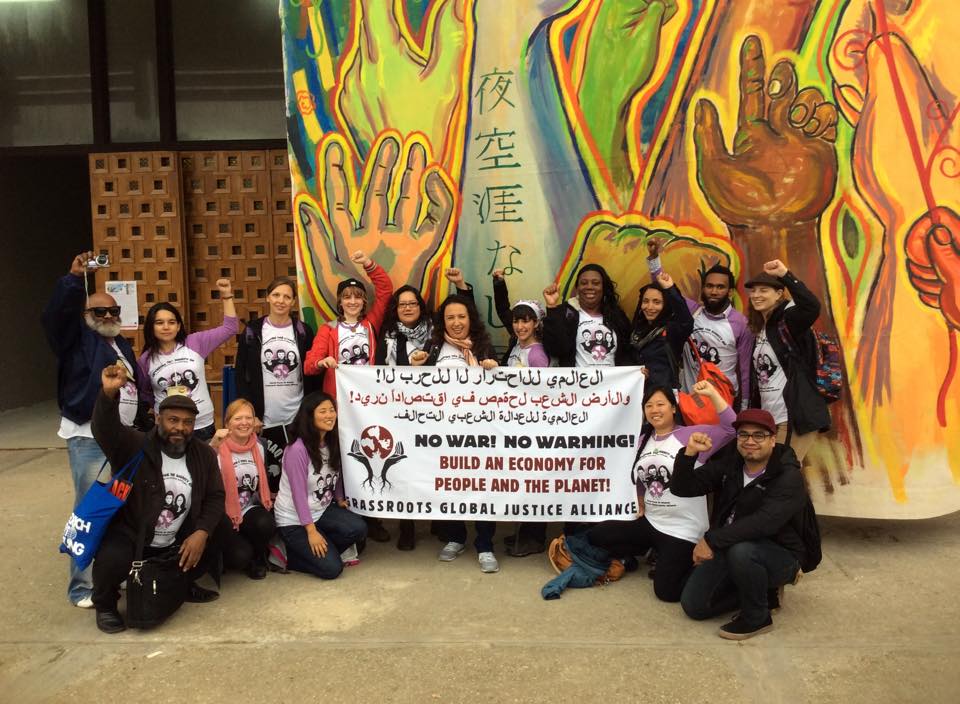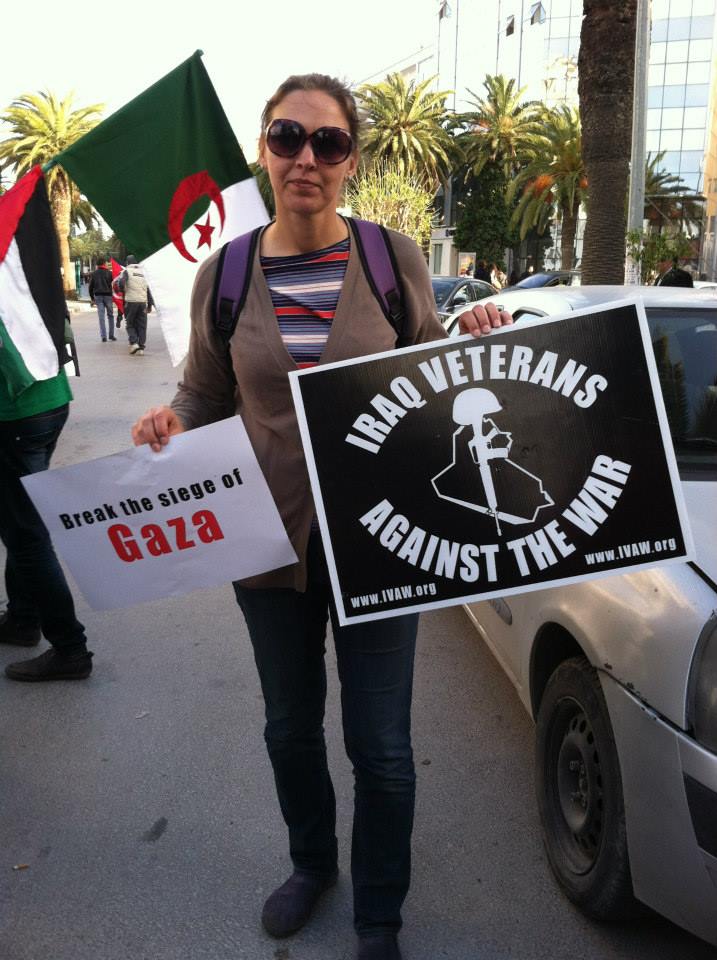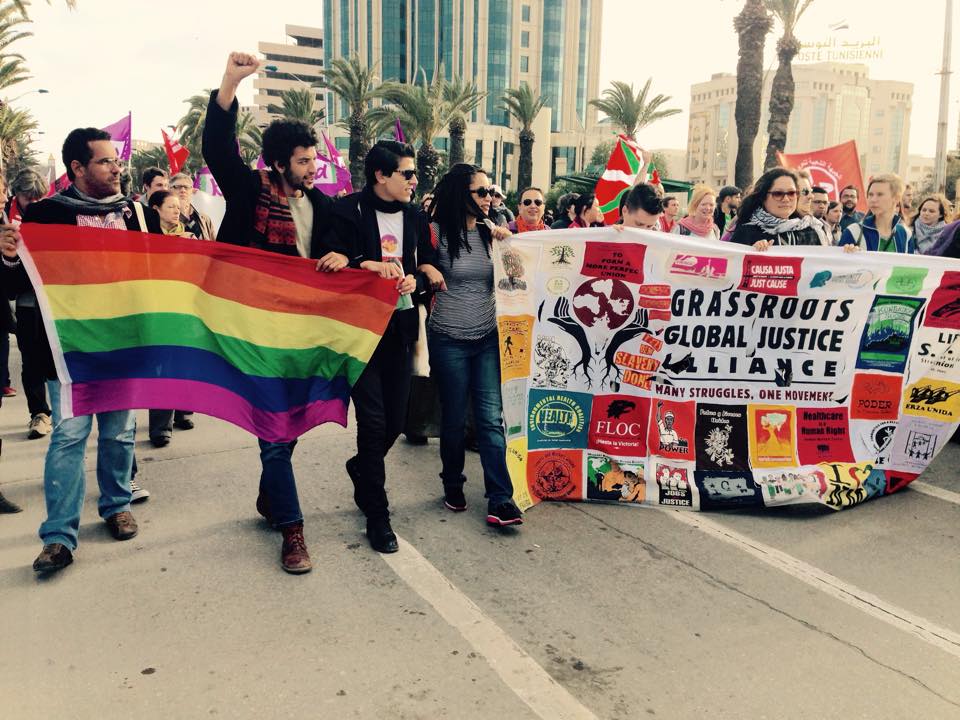by Maggie Martin, Iraq Veterans Against the War (IVAW)
I’ve tried, pretty successfully, to live a life without too much fear. Growing up I didn’t follow the rules of stranger danger. I talked to everyone I met, picked up hitchhikers, went out to unfamiliar places alone, and I’m convinced it has enriched my life. I’ve been lucky; I’ve never had anything bad happen, at least not from someone I was supposed to be afraid of. After all my biggest source of trauma has come in the form of surprise attack from someone I was in a relationship with¾not a stranger lurking behind a bush.
My outgoing and trusting nature even translated to the war zone, where I was regularly reprimanded for trying to make friends with the Iraqis instead of treating them as a threat to our safety. When we were at the market or on our camp “guarding” local Iraqi workers my curiosity and desire for connection always outweighed my sense of fear and danger.

This attribute is so essential to my sense of self that I was really struggling with the nervousness and even fear that I felt while I was preparing to go to Tunis, Tunisia, as a Grassroots Global Justice Alliance (GGJ) delegate at the 2015 World Social Forum. I was feeling reservations even before the attack at the Bardo Museum in Tunis, which killed 21 people. When the attacks occurred and then when a few days later ISIS or Daesh claimed responsibility I was feeling near panic, or maybe I just let myself more openly express this fear, which all of a sudden seemed more justified. I felt disappointed in myself and determined to examine if what I was feeling was my own internalized Islamophobia.
I knew since my flight was scheduled to leave within a few days that I had to make a decision about whether I would still attend or not. I was still worried but with the reports from Tunisia that security was under control and that we would have a very high likelihood of complete safety I decided not to let fear win.
I realized in a conversation with a friend that returning to the Middle East and North Africa (MENA) region as a social justice advocate was bringing up a lot of feeling about my other visits to the region as a US soldier. I spent some time alone unpacking and examining those feelings. When I was finally in Tunisia my fear drifted away during the opening march as I joined thousands of strangers, all of us in a roar of excitement that couldn’t be dampened by the pouring rain. Floating in a sea of people from all over the world, speaking many different languages and observing each other, I marveled at the fact that we all had come from different places but had common causes.
My fear hadn’t vanished but it did subside and in the space came a flood of shame. I realized that I felt fear largely because I felt profound guilt. I felt like I was as legitimate of a target as anyone could be. I had been a US soldier; I had occupied Iraq; and our US wars in Iraq and Afghanistan had led to the rise of ISIS. I mentally prepared to be called an imposter, a fraud and someone who had participated in great violence. How could I expect to be here searching for new friends?

The judgment I expected never came. When I nervously introduced myself to a woman from Iran who had searing criticism about the role western imperialism plays her home country, she embraced me as a friend. This was my experience over and over, and my most cherished connections were those I made with women dealing with the effects of war and occupation in Kurdish Iraq and Palestine. The most inviting and accepting of all the people I met must have been the young Tunisians.
I have to say a word about these brilliant and vibrant young people who carry on the revolutionary spirit of Tunisia, and especially the young Tunisian volunteers. They were there in the thousands from Tunis and all over the country and they were absolutely essential to the Forum. These young volunteers were spread across the huge campus at every corner and at every building to help attendees find our way around. Most of the volunteers worked for free in exchange for food and housing for those who came from out of town. It seemed clear about halfway through the Forum that these amazing volunteers had a hard time getting the small benefits they were promised but even when they came together to protest their own working conditions, they were still willing to assist in several languages to help attendees find workshops and event locations. One volunteer-translator turned into an active participant and translator of the Feminist Unite workshop that took place as the other volunteer workers met to plan out their strike.
Tunisians wanted to know how we found their country and to assure us that it is a very safe place. I felt that¾and I believed them. I couldn’t bring myself to apologize for my role in making it less safe because I didn’t know if people would understand my self-centered analysis, or maybe processing my own feelings was not the best use of energy in that space, or maybe I just wanted to remain in the sunshine of their acceptance. I did feel sorry but mostly I felt love and appreciation for the people I met and spoke with and for all the people who had come there together in hope.
I appreciated when another Iranian woman living in France brought up circumstances of oppression and sectarian violence that has led to the rise of extremism in the region. It dawned on me that recognizing the humanity of so-called terrorists is a difficult thing to do. When we talk about the oppression and state sponsored violence against Iraq’s Sunni minority does it mean we justify heinous ISIS attacks? I don’t think so; it’s just recognizing a more full reality. Like when I talked to fellow delegates about the fact that my ex, who had assaulted me, had spent over 20 years in the military, that he had deployed multiple times to dangerous missions, and that he likely suffers from trauma of his own. As my friend said it’s not a justification, it just is.
Being able to share my past experiences and my reflections on what I was feeling during the trip with fellow delegates made the experience more significant. Over the week I had been able to crack myself open and make an inventory and analysis of past and current emotions, I came to rely on the delegates I traveled with and the people I connected with there to help me heal and understand a little bit more about how my experiences shape who I am. I learned that the choice to not live in fear is as important in Tunisia as it is anywhere else, that I am connected to other people around the world in a variety of ways and that I don’t need to let my role as a US soldier stand as the primary way to realize this connection with others. I realized that I can’t change the past, but I’m certain the work that I chose to do to change the future matters.

The Forum ended with a solidarity march for Palestine. The day was gorgeous, the people were beautiful and I was so pleased to march amongst my GGJ delegation, the World March of Women, and an Arab LGBT contingent that found safety and support amongst us. I’m incredibly grateful to have had this experience and I will do it justice by carrying it with me. The struggle continues until all people can live with justice and in dignity and we need to be our full and complete selves to transform our own lives and our society.
